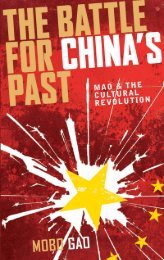Adam Smith's Critique of International Trading ... - Political Theory
Adam Smith's Critique of International Trading ... - Political Theory
Adam Smith's Critique of International Trading ... - Political Theory
You also want an ePaper? Increase the reach of your titles
YUMPU automatically turns print PDFs into web optimized ePapers that Google loves.
Muthu / Smith’s <strong>Critique</strong> <strong>of</strong> <strong>International</strong> <strong>Trading</strong> Companies 189<br />
non-European governments and undermined their societies’ ability to engage<br />
in just and equitable self-rule. Smith ultimately presents a pr<strong>of</strong>oundly<br />
ambivalent understanding <strong>of</strong> globalization. He believed that the development<br />
<strong>of</strong> global commerce from 1492 through to his own time had been<br />
tremendously destructive—socially, economically, and politically—and<br />
had rested upon patently unjust practices and venal institutions. Yet he also<br />
believed that the ever more frequent exchanges <strong>of</strong> goods, technologies, and<br />
ideas across borders—even within a deeply unequal and unjust geopolitical<br />
context—were bound to foster developments in the long run that would<br />
begin to empower weak and vulnerable societies.<br />
In what follows, I discuss in the first section Smith’s commitment to<br />
commercial liberty as a human right. The idea <strong>of</strong> a right <strong>of</strong> commerce,<br />
broadly understood, lends Smith’s analysis much <strong>of</strong> its moral force. I also<br />
show how this understanding <strong>of</strong> commercial liberty informs what I argue<br />
are the two historical narratives that Smith presents in the Wealth <strong>of</strong><br />
Nations. In the following two sections, I then present two central features<br />
<strong>of</strong> Smith’s critique <strong>of</strong> international joint stock companies. In the second<br />
section, I analyze Smith’s argument that the companies themselves are<br />
inherently pathological because <strong>of</strong> their organization and economic structure,<br />
both <strong>of</strong> which help to create various forms <strong>of</strong> political corruption. As<br />
I show, it was along these lines that Smith argued that international trading<br />
companies undermined their home countries in Europe. In the third section,<br />
I examine Smith’s contention that such companies have destroyed most <strong>of</strong><br />
the non-European countries that they have dealt with, for reasons that have<br />
to do fundamentally with the very nature <strong>of</strong> these companies and the distinctive<br />
kinds <strong>of</strong> economic and political corruption to which they are prone.<br />
Finally, in the fourth section, I conclude by discussing Smith’s conjectures<br />
about the possible connections between global commerce and some semblance<br />
<strong>of</strong> global justice. Ultimately, in Smith’s view, only significant political<br />
changes in the international order could begin to address the injustices<br />
<strong>of</strong> global commerce. In the (notably few) optimistic passages about the<br />
development <strong>of</strong> global commercial and communicative ties across borders<br />
in the Wealth <strong>of</strong> Nations, Smith hoped that over time European states would<br />
lose their economic and political dominance while non-European peoples<br />
would gain significant power at Europe’s expense. He argued that only with<br />
such an increasing equality <strong>of</strong> force among nations, and crucially with the<br />
mutual fear that it inspires, would European sovereign and corporate powers<br />
commit fewer injustices and begin to respect non-Europeans’ rights. Yet<br />
Smith never predicted that the company-driven system <strong>of</strong> commerce that<br />
he detested would stop structuring and corrupting international political
















